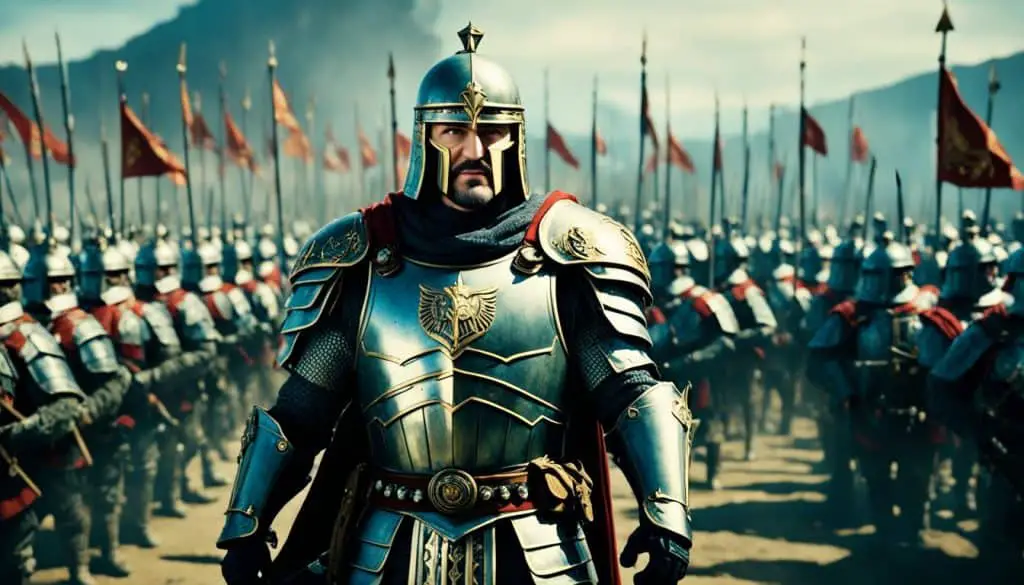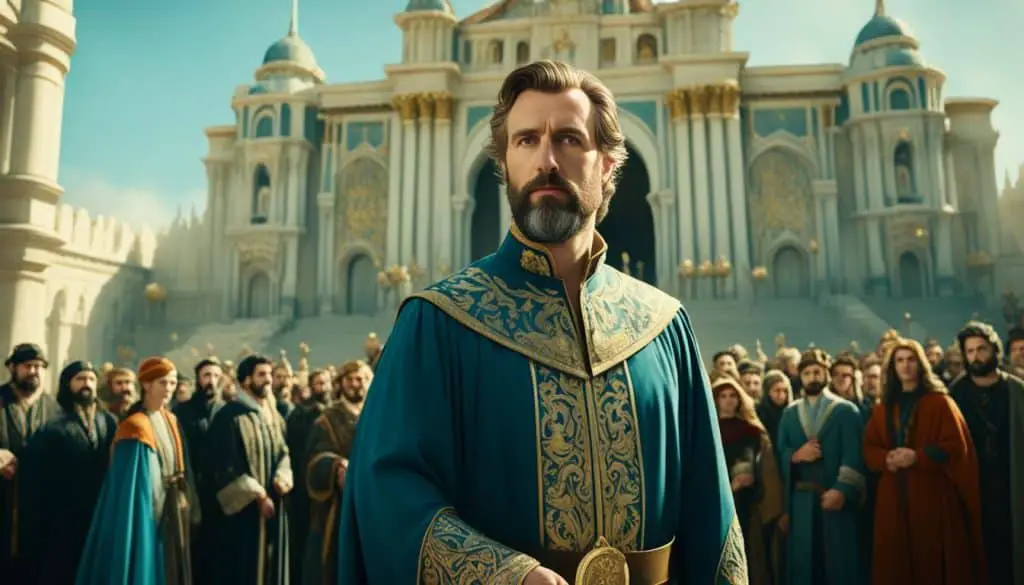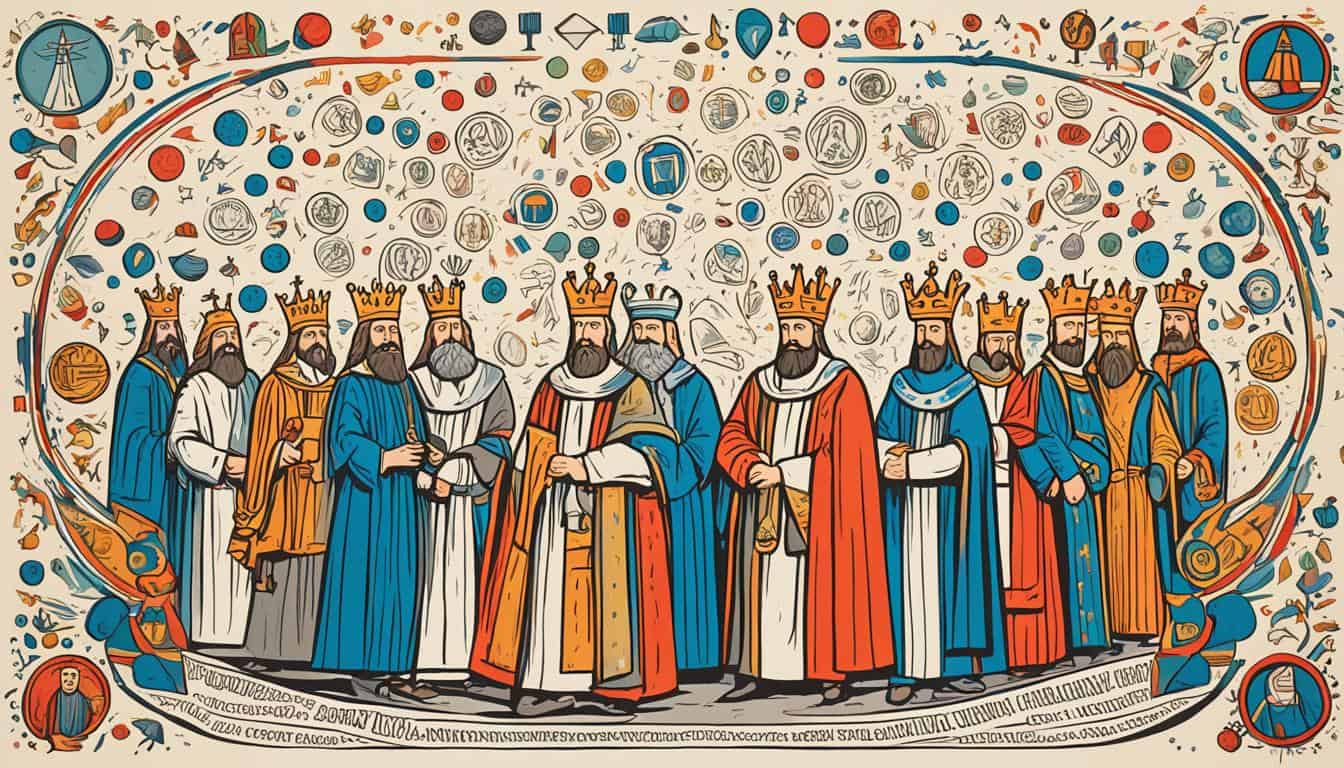Table of Contents
Did you know that the Bible holds valuable historical and cultural info, not just religious teachings? It introduces us to royal officials who had key roles in biblical times.
Imagine Joseph, a high officer in Egypt, or Esther, a courageous queen in Persia. These figures wielded power that shaped many people’s lives then. But what exactly did they do?
We’ll go deep into the stories of these officials, showing their unique roles in Bible events. You might be surprised by what we find. Their jobs were not always as expected.
Are you ready to take a trip through ancient times, learning about these intriguing figures? Together, we’ll explore the Bible’s royal officials and their significant roles.
Joseph: Vizier of Egypt (Genesis 41:40-46)
Joseph was appointed by Pharaoh to be the vizier of Egypt, a high-ranking role. He managed the country’s affairs with great wisdom and faith. Starting as a slave, Joseph rose to be Egypt’s second-in-command.
His job included overseeing food storage, taxes, and the economy. During years of plenty, Joseph made sure Egypt saved enough food. This preparation helped the country survive a long famine.
“And Pharaoh said to Joseph, ‘See, I have set you over all the land of Egypt.'” (Genesis 41:41)
Joseph’s leadership led Egypt to economic success. He was a figure of prosperity in the region. Only Pharaoh had more power than Joseph.
Joseph not only reached a high position but also showed incredible character and faith. Despite betrayal and false accusations, he remained true to God. He used his power to help his family and fulfill God’s plan.
Joseph’s story teaches us about leadership, staying strong in hard times, and trusting God’s plan. He inspires us to hold onto our faith and values, no matter the challenges.
Joseph’s Responsibilities as Vizier of Egypt
| Responsibilities | Role |
|---|---|
| Food storage and distribution | Ensure efficient stockpiling and allocation of grain |
| Taxation | Oversee the collection and management of taxes |
| Economic management | Implement strategies to promote economic stability and growth |
Table: Joseph’s Responsibilities as Vizier of Egypt
Potiphar: Captain of the Guard (Genesis 37:36)
Potiphar was an important man in ancient Egypt. He was the Captain of the Guard, meaning he looked after the king’s safety and the palace’s security.
His job was key in keeping the Egyptian kingdom safe and running smoothly. He directed soldiers, managed security, and helped protect the land.
As the Captain of the Guard, Potiphar had a lot of power. He advised the king on how to keep the kingdom safe and strong.
In the story of Joseph, Potiphar plays a big part. He helped Joseph go from a slave to a powerful person in Egypt.
Even though Joseph had many troubles, Potiphar saw his potential. He trusted Joseph to do important work in his home.

Nehemiah: Royal Cupbearer (Nehemiah 1:11)
In biblical times, Nehemiah was important to the king. He was the one trusted to taste the king’s wine first. This duty made him very close to the king, winning his trust.
As the cupbearer, Nehemiah had more than just a title. He had the power to speak directly to the king and affect royal decisions. This special access let him push for things he believed in.
Nehemiah’s story includes a major turning point. When he found out Jerusalem was in ruins, he asked the king for help fixing it. Thanks to his role, he could ask the king directly and got his support.
With the king’s approval, Nehemiah set out to rebuild Jerusalem’s walls. He faced many obstacles but showed great leadership. His drive and courage became a model of determination and commitment.
“For I was the king’s cupbearer.” – Nehemiah 1:11
Nehemiah’s role as cupbearer is a great lesson. It shows how someone in power can do good. His example urges us to use our skills to better the world around us.
| Key Role | Responsibilities |
|---|---|
| Royal Cupbearer | Tasting and ensuring the safety of the king’s wine |
| Advisor | Gaining the king’s trust and influencing his decisions |
| Advocate | Using his position to advocate for the rebuilding of Jerusalem |
| Leader | Overseeing the rebuilding of Jerusalem’s walls |
Nehemiah’s story highlights the power of trust and influence. It challenges us to take action and make the world a better place. His impact remains a force for change today.
Daniel: Chief Administrator (Daniel 2:48-49)
In the Bible, Daniel’s story shows how his wisdom and honesty led to great success. King Nebuchadnezzar saw that Daniel stood out from others because of his character and knowledge. So, he appointed Daniel as the main leader over the wise people of Babylon. This meant Daniel was not just providing suggestions to the king, but also managing the empire in some ways.
“Daniel, your God is indeed the God of gods, the Lord over kings, and the revealer of mysteries, since you were able to reveal this mystery.” – Daniel 2:47
When Daniel became the chief administrator, his life changed in a big way. Now, he could help make the important choices for the empire. The king believed in Daniel’s exceptional wisdom. So, he gave him the responsibility to look after Babylon’s matters.
Daniel’s job was vital for the empire’s success. He talked to the king about the empire’s policies and decisions. He also made sure things worked well in the empire’s systems. His skill at explaining dreams and visions made him a trusted advisor.
Daniel was known as a servant leader. He took on his role with humbleness and a strong sense of duty. He stayed true to his faith, trusting God, no matter the hard times. Because of his just and fair actions, both the king and other leaders respected and liked him.
Key Responsibilities of Daniel as Chief Administrator:
- Advising the king on matters of state
- Managing the affairs of the empire
- Overseeing the wise men of Babylon
- Interpreting dreams and visions
- Ensuring efficient governance

Esther: Queen of Persia (Esther 2:17)
Esther was an inspirational figure in biblical history. She was a queen who also showed immense courage. She played a key part in saving her people. As a queen not by birth, her story shows amazing dedication and bravery against hard times.
Her story started when she joined the king’s harem. She kept her Jewish heritage secret. Her uncle, Mordecai, found out about a plan to destroy the Jews. This plan was made by a top official, Haman.
“For if you remain silent at this time, relief and deliverance for the Jews will arise from another place, but you and your father’s family will perish. And who knows but that you have come to your royal position for such a time as this?”
These meaningful words made Esther realize she must act. Risking her life, she told the king she was Jewish. By doing this, she hoped to save her people from Haman’s bad plan.
During a big dinner, Esther spoke up, asking the king to save her people. Her brave act changed history. It showed her deep faith and loyalty to her people.
The king understood how serious things were and granted Esther’s request. He stopped the order to hurt the Jewish people. This led to celebrations and the Jews being safe. Esther’s bravery and her role as queen saved her people in a surprising way.

Esther’s story still motivates people today. It highlights courage, faith, and the impact one person can have. Even when things are tough, we can rise up and bring good changes.
| Lessons from Esther: |
|---|
| 1. Courageous individuals can shape history |
| 2. The power of faith and divine intervention |
| 3. The influence of influential positions |
| 4. The importance of taking risks for a greater purpose |
David: Commander of the Army (1 Samuel 18:15-16)
David showed his skill as a military leader before he became king. He earned the trust of King Saul. David led Israel’s army to many victories with his smart tactics and courage.
“David went out and was successful wherever Saul sent him. Saul was so impressed he put David in charge of the military. Everyone, including Saul’s servants, thought very highly of David.”
David was known for his strategic planning, cleverness, and a strong sense of duty. His battlefield skills led to many wins against tough enemies. This helped keep the nation safe and its borders secure.
During David’s leadership, Israel’s army won over many threats. This made the country stronger and its people more united. David’s war efforts made Israel a respected nation in its area.
Achievements as Commander of the Army:
- Defeated the Philistine giant Goliath, showing great courage and fighting skills.
- Won many battles against Israel’s foes, making the kingdom larger.
- Created a strong military setup and used smart tactics, keeping the army ready and efficient.
- Built strong bonds and teamwork among his soldiers, creating a loyal and united fighting group.
David’s leadership as the army’s commander paved the way for his kingship. His skills and love for his people could teach leaders and citizens a lot even today.

| Key Contributions | Outcome |
|---|---|
| David’s defeat of Goliath | Boosted morale and made David famous as a brave warrior. |
| Successful military campaigns | Increased Israel’s land and protected it from enemies. |
| Organized military structure | Boosted the army’s performance and readiness for war. |
| Instilled loyalty among soldiers | Built a strong and united army. |
Joab: Chief Commander of the Army (2 Samuel 8:16)
Joab was the main military leader under King David. He was key in winning many battles for Israel.
Being the chief commander meant Joab had a lot of power and duty. He planned campaigns, led soldiers in battles, and made sure Israel was safe.
With Joab in charge, Israel won many fights and grew. His smart strategies and deep commitment were vital to King David’s success.
“Joab’s strategic genius and unwavering loyalty to King David were crucial in securing the military success of Israel. He navigated through challenging battles, demonstrating his exceptional leadership skills.”
Joab was more than just a great soldier. He could also motivate and lead his troops well. Both soldiers and leaders respected him, making him a key figure in Israel’s history.
However, Joab’s loyalty to King David led to some tough choices. This includes ordering the deaths of some important people. These actions show a deeper side to Joab’s character.
The Legacy of Joab
Joab made a big impact during his time in charge. His genius in war and loyalty made him very influential. Even now, people study his story to understand his true character.
Joab’s story tells us a lot about leadership and power. His dedication to Israel and victories in battle are lessons for all times. He was a truly exceptional chief commander in biblical history.

Rehoboam: Tax Collector (1 Kings 12:4)
In biblical times, Rehoboam managed the taxes for the Israelite kingdom. He was King Solomon’s son. His work was key to keeping the kingdom’s money safe. But, due to how he did his job, the kingdom split.
At the start, Rehoboam wanted to show he was in charge. The people asked him to lower the taxes they paid. He talked with older advisors and younger friends to decide what to do. He chose to raise the taxes, which made many people unhappy.
His hard tax policies helped split the Israelite kingdom. The northern tribes made their own kingdom with Jeroboam as their leader.
The split caused lots of fighting between the north and the south. Rehoboam’s taxes and his choice not to listen made things worse. This split lasted a long time and was very hard on the people.
Back then, everyone knew about taxes. Tax collectors were very important for a kingdom’s money system. But Rehoboam’s mistake shows how a leader’s choices can hurt a nation. A leader must listen and act for the good of all.

Significance of Tax Collection in Biblical Times
Tax collection was critical for the ancient world’s leaders, economies, and societies. It funded the army, public works, and essential services. Collectors were crucial in keeping the kingdom running and people living well.
But, being a tax collector wasn’t easy. They had to make sure the kingdom had enough money without hurting the people too much. How they did their job affected everyone’s life. They needed to be fair, caring, and smart.
| Role of Tax Collectors in Biblical Times | Responsibilities |
|---|---|
| 1. Gathering Revenue | Collecting taxes from the people and ensuring the funds reached the treasury. |
| 2. Enforcing Tax Laws | Implementing and enforcing tax regulations to ensure compliance. |
| 3. Managing Records | Maintaining accurate records of tax collections, assessments, and exemptions. |
| 4. Advising Rulers | Providing insights and recommendations on tax policies, economic matters, and financial planning. |
Tax collectors like Rehoboam held much power. They could shape the kingdom’s economy and people’s lives with their choices.
Rehoboam’s story is a lesson in leadership. He didn’t balance his power well, causing harm. Leaders must listen and act in the best interest of their people. This way, they avoid the damage Rehoboam caused.
Solomon’s Builders: Overseers (1 Kings 5:16)
King Solomon was famous for his wisdom and big projects. He knew skilled overseers were key to bring his ideas to life. He had a special team called Solomon’s Builders to manage the building of the temple and other huge structures, as told in 1 Kings 5:16.
These overseers were essential for the projects’ success. They made sure craftsmen worked well together and resources were managed properly. Their focus on quality helped make sure Solomon’s building work was top-notch.
The Solomon’s Builders worked closely with experts and workers. They turned the king’s plans into real buildings. They ensured every detail matched Solomon’s designs perfectly.
“As overseers, it was their duty to ensure every aspect of the construction adhered to the highest standards of quality and craftsmanship,” says biblical scholar Dr. David Harris. “By overseeing the builders, Solomon established a culture of excellence that permeated every facet of the projects.”
The overseers weren’t just picked for what they knew. They were chosen because they could lead big teams well. Their ability to organize and pay attention to detail was key to managing big projects.
Also, they managed the huge team working on the projects. They made sure everyone was trained and materials were used well. Their job was to keep everything running smoothly and solve any problems quickly.
The Role of Solomon’s Builders in History
Solomon’s Builders did more than build great buildings. Their work made Israel stand out in the ancient world. It brought other nations to admire Israel, improving its connections and reputation.
Their work at the temple and other sites showed the world the Israelites’ deep faith. These buildings were made to show devotion and to be a place of worship. They were built with care and skill, reflecting their spiritual importance.
What Solomon’s Builders did had a lasting impact. Their dedication and focus on quality are still respected today. They left an example of how hard work and attention to detail lead to lasting success.

The Enduring Legacy of Solomon’s Builders
Today, we still see the influence of Solomon’s Builders. The amazing buildings they created are still here. They impress and inspire people from all over the world.
Their story shows that working together towards a clear goal achieves true greatness. Their dedication and work for Israel stands as a key part of biblical history.
The Magi: Astrologers/Royal Advisors (Matthew 2:1-12)
The Magi were known mainly for their skills in astrology and advising royalty. They weren’t officially titled but were highly respected in their fields. Kings and leaders relied on their astronomical knowledge for important advice.
In Matthew’s Gospel, the Magi are key figures in Jesus’s birth story. They followed a special star to worship the newborn king. This event underlines their roles as political and spiritual advisors, searching for significant events.
Experts in astrology, the Magi understood the significance of celestial events. They could predict outcomes of wars and the health of the land. Their insights were highly valued by rulers around the world.
Besides being astrologers, they also advised on state matters and diplomacy. Their wisdom was pivotal for kings and empires. This showed the high regard in which they were held, due to their influence.
While the Bible doesn’t tell us much about the Magi individually, it does highlight their mission to honor Jesus. Their visit symbolizes their acknowledgment of his future importance. They came to honor the newborn king.




